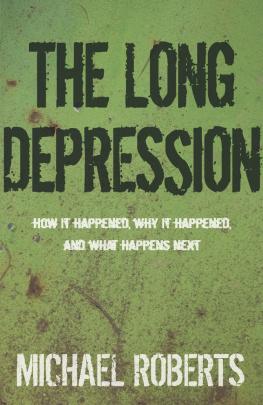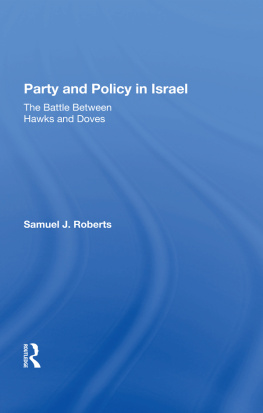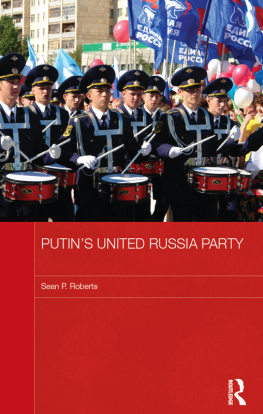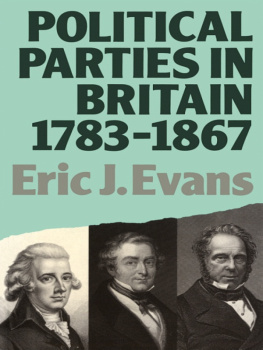Routledge Revivals
The Whig Party, 1807 - 1812
The Whig Party, 1807 - 1812
Michael Roberts
First published in 1939 by Macmillan & Co. Ltd.
Published in 1965 by Frank Cass & Co. Ltd.
This edition first published in 2018 by Routledge
2 Park Square, Milton Park, Abingdon, Oxon, OX14 4RN
and by Routledge
52 Vanderbilt Avenue, New York, NY 10017
Routledge is an imprint of the Taylor & Francis Group, an informa business
1939 by Taylor & Francis
All rights reserved. No part of this book may be reprinted or reproduced or utilised in any form or by any electronic, mechanical, or other means, now known or hereafter invented, including photocopying and recording, or in any information storage or retrieval system, without permission in writing from the publishers.
Publishers Note
The publisher has gone to great lengths to ensure the quality of this reprint but points out that some imperfections in the original copies may be apparent.
Disclaimer
The publisher has made every effort to trace copyright holders and welcomes correspondence from those they have been unable to contact.
A Library of Congress record exists under ISBN:
ISBN 13: 978-0-367-14909-3 (hbk)
ISBN 13: 978-0-429-05387-0 (ebk)
THE WHIG PARTY
18071812
THE WHIG PARTY
18071812
MICHAEL ROBERTS
First published by Macmillan & Co. Ltd., in 1939
and now reprinted by their kind permission.
This edition published by Frank Cass & Co. Ltd.,
10, Woburn Walk, London, W.C. 1.
First edition 1959
Second edition 1965
Printed by Thomas Nelson (Printers) Ltd
London and Edinburgh
CONTENTS
I BEG leave to record my humble thanks to His Majesty the King for permission to make use of the papers of George III, Queen Charlotte, and George IV preserved in the Archives at Windsor Castle.
I have further to thank Brigadier-General W. R. N. Madocks, C.B., C.M.G., D.S.O., for having allowed me to use the papers of George Tierney which are in his possession; Professor L. B. Namier, the Editor of this series, for valuable advice and suggestions which have saved me from many errors; Professor G. S. Veitch of the University of Liverpool, and Professor W. B. Hall of Princeton University, for guidance and encouragement; Major E. B. Walker, M.B.E., M.C., for help with (b) (4), which have appeared already as separate articles in that journal; Mr. L. V. Sumner, who has given valuable assistance in preparing the book for the press.
The publication of this book has been facilitated by assistance from the Hiddingh-Currie publication fund of the University of South Africa. Dr. William Hiddingh and the family of Sir Donald Currie each contributed 25,000 to the University of the Cape of Good Hope. This money was utilized in the erection of the new University buildings, but when the University of South Africa became the legal successor of the University of the Cape of Good Hope and the offices were moved to Pretoria, the buildings could no longer be used for the purpose for which they were erected. They were taken over by the Union Government for 45,000, and an endowment fund was created. A portion of the interest derived from this sum has been set aside by the Council of the University of South Africa to commemorate the munificence of these generous benefactors by the creation of the Hiddingh-Currie publication fund and the Hiddingh-Currie Scholarship. I wish to express my gratitude to the University of South Africa for the grant made me from this fund.
In order to avoid confusion with the works of the late Sir John Fortescue, the Hist. MSS. Comm. Report on the MSS. of J. B. Fortescue, Esq., is cited throughout as Dropmore Papers. In the Windsor Archives the Correspondence of George IV is divided into three series: Correspondence of the Prince of Wales, Correspondence of the Regent, Correspondence of George IV. As these nowhere overlap in date, but form in fact one continuous series, it seemed simplest to cite them as Windsor Archives, George IV, since the dating of the letters precludes ambiguity.
M. R.
1936
PITT died on 23 January 1806, and the weak Ministry of which he had been the head did not long survive him. It became impossible for George III to continue his exclusion of Fox from office; and for the next year England had a coalition Government of Whigs, Grenvillites and Addingtonians, known to history as the Ministry of All the Talents. The greatestindeed the soleachievement of this Administration was the Abolition of the Slave Trade; but this had not by any means been the only item upon its political programme. It had hoped to put an end to the war, and it had desired to lift some of the restrictions which lay upon the Roman Catholics. But the restless ambition of Napoleon had foiled Foxs conscientious efforts to arrange a peace; and the obstinate prejudice of George III had thwarted the endeavours of Grenville and Howick to obtain Catholic Emancipation. The quarrel with the King led to the fall of the Government in March 1807; and the remnants of Pitts party cheerfully resumed the responsibilities of office.
From 1807 to 1812 England was ruled by two Tory Governments: that of the Duke of Portland, until September 1809; and that of Perceval, until his assassination in May 1812. Neither Ministry was particularly strong. The Portland Administration was handicapped by the inefficiency of its head and by dissensions among its members, and ultimately fell as the result of the well-known quarrel between Canning and Castlereagh. Perceval, who succeeded to the Premiership, was regarded with jealousy by Wellesley and Canning; and despite his many admirable qualities, and his great influence over the Tory rank and file, he was hardly equal to the responsibilities of his post. His Government had had the misfortune to begin life under the odium of the Walcheren disaster, and it was further weakened by a series of political scandals, in some of which members of the Administration had been involved. Moreover, when the King went mad at the end of 1810, it lost its steadiest and most formidable supporter. The Prince of Wales, though he was not to be trusted by any party, seemed certainly at the beginning of his Regency to have strong Whig sympathies; and for the next twelve months he appeared likely to dismiss the Tories at any moment. It was not until he made his final decision in February 1812 that the Tory Administration could feel secure.
It is therefore surprising that the Whigs should have been so ineffective in Opposition. On at least four occasions they had apparently an excellent chance of turning out their rivals, but each time they failed. Twice they refused office, and twice they were disappointed by the Prince. This book attempts to explain these disappointments and refusals, and by a survey of Whig policies to show how ill-suited the party was to the task of ruling the country at this crisis of her history.
After Foxs death, the leadership of the Talents had been divided between Howick (afterwards Lord Grey) and Grenville. They were an ill-assorted pairthe one an early advocate of Parliamentary Reform, the other a consenting party to Pitts repressive legislation. Only mutual forbearance upon subjects of controversy, and zealous coperation for Catholic Emancipation, held their alliance together. In the years 18071812 Catholic Emancipation stood first in the political programme of the Whigs, and was consistently championed by them in Parliament. Their enthusiasm in the cause was whetted by the bitterness they felt at the manner of their fall in 1807; but their obstinate fidelity to it alienated the sympathies of the nation, and was one of the main reasons for their failure to obtain office. deals with their attitude to this question. The circumstances of the change of Ministry in 1807 are first examined; they were to be of great importance for what followed. Next comes a consideration of the various suggestions which were put forward for granting Emancipation in exchange for some measure of governmental control over the election of Irish Catholic Bishops. The misunderstanding which arose between the Whig leaders and Dr. Milner on this point, and their persistent refusal to have anything to do with the Irish democrats, robbed them of the gratitude which Ireland might otherwise have felt for their disinterested efforts; and when, in 1812, the urgency of Emancipation forced itself upon the notice of other English politicians, Tories like Canning were able to steal their thunder. Thus the Whigs championship of Emancipation reacted unfavourably upon their chances in England, and brought them no solid support from Ireland by way of compensation.














